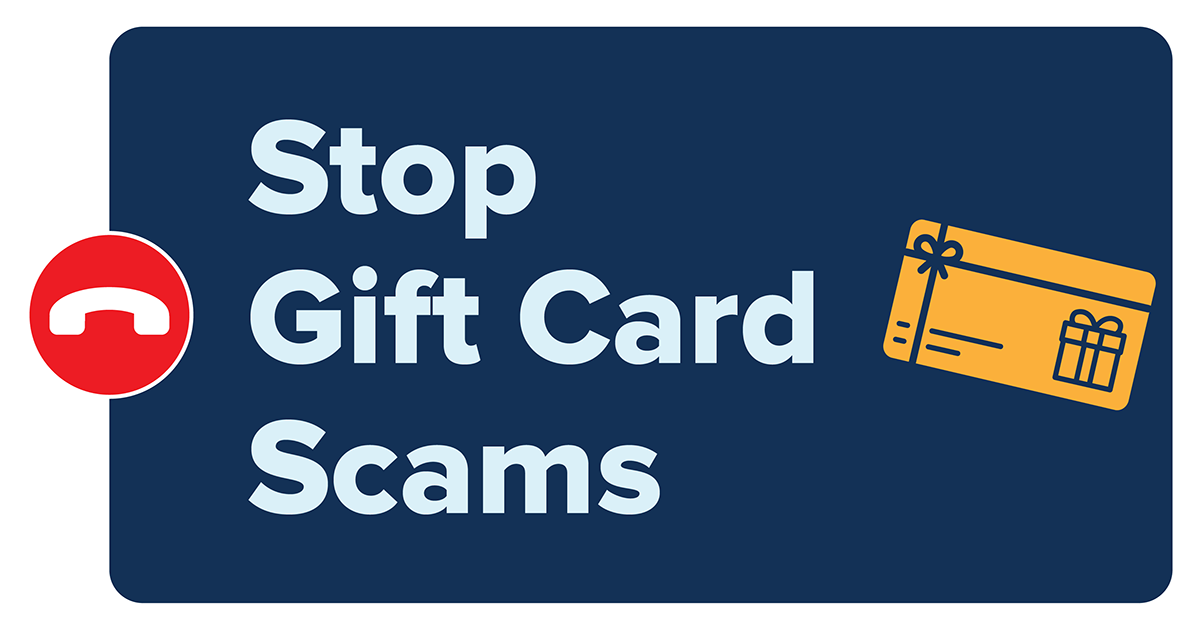What are Gift Card Scams?
Gift cards, also known as gift certificates or vouchers come in two types, physical and digital. They can be open-loop or closed-loop.
Basically, a gift card is a method of payment that can be used to purchase things at retail stores, gas stations, restaurants, and several other places. Money is being loaded unto the card and is being spent either at accepted locations or used at precise merchants. Physical cards are physical, that is as a plastic card while the digital type entails being assigned a unique gift code number.
Although gift cards can offer legitimate ways to procure goods and services, they are popular among scammers and malicious cyber attackers because of how accessible they can be.
They are almost the same as cash and once a scammer gets hold of the numbers on your card or PIN, they can be able to infiltrate your account and take your money.
According to reports by the Federal Trade Commission, gifts card scams topped the list of reported fraud payment methods every year since 2018.
These scams with gift cards often start when someone asks you or pressures you into buying gift cards in order to make purchases, once you have the card, scammers will then trick the users into revealing their identification number and PIN by pretending to be government worker, or a close partner. When they get this information, they will be able to redeem the card for its total value or use it and make purchases in the black market.
What makes gift scams popular among fraudsters is the fact that it is anonymous and almost impossible to trace the transaction, reverse or cancel it. It’s just paying in cash, once the money is out, it’s gone for good.
These fraudsters exploit people using several tactical means: It could be prize offers, where users are told they won this or that and needs to get a gift card to redeem the prize.
They could set up social profiles on dating sites to build fake love interests, technical support scams, where users get messages saying that their devices have viruses and are required to buy gift card to pay for the repair cost (Anti-virus scams), or make up a bogus reason as to why they require gift cards.
Other major strategies are, fake online auctions, fake card activation websites, scammers claiming to be with the IRS or a government representative and demanding for official payment, they can sound incredibly genuine by calling out your secret documents and information but users should be aware that no government parastatal demands for payment with a gift card. These are all geared towards deceiving the users into giving up their private information.
In the crypto space, gift card scams are similar to the ones we see in the traditional instances. Rather than gift cards, fraudsters in the crypto space use cryptocurrencies like BTC, ETH or any other altcoin.
Scammers lure users into transferring cryptocurrency to them with empty promises such as rewards or investment opportunities. They are able to convince the victims by using phishing websites, deceptive social media profiles or other tactical methods.
They vanish after receiving cryptocurrencies from their victims, depriving them of any chance to recover their money. As the crypto space keeps evolving with several potentials, so also does malicious actors seek out new strategic ways to loot user’s money.
It is important to note that outside of the traditional, proposed purposes of gift cards, any other requests to make gift card transactions should be treated suspiciously.
A close examination, exercising caution and conducting business with a trustworthy client is essential when working with cryptocurrencies as its volatile nature could cause a lot of losses for users.
How do Gift Card Scams Work?
Due to the untraceable and anonymous nature of gift cards, scammers can safely use gift cards to convert stolen funds into any form of currency or merchandise and might get away with it.
Scammers begin by convincing an unsuspecting victim to purchase cryptocurrency using gift cards, such as those popular for retailers like Amazon or iTunes.
The scammer might pretend to be from a legitimate cryptocurrency exchange or trading platform and make an offer to the victim that seems too good to be true, example: promising to significantly double their investment in a short period of time. As soon as the victim concurs to this, the scammer will ask them to purchase gift cards and offer the card codes as payment for the cryptocurrency.
The scammers may claim that they require gift cards in order to avoid taxes, keep the transaction anonymous, or to purchase the cryptocurrencies but that’s not the case in reality as they would soon vanish without a trace, leaving the victims with nothing.
Below is an example of how a gift card scam typically takes place:
- Step 1: In order to endorse a cryptocurrency giveaway or enticing investment opportunity, the scammers create a false social media account or website to publicize and attract unsuspecting users.
- Step 2: The fraudster entices the users by assuring them of a significant amount of cryptocurrencies in exchange for a trivial contribution supposedly required to fund the investment scheme or confirm the user’s identification.
- Step 3: The scammers would demand that users make deposits with a gift card such as Amazon, Apple gift cards or iTunes in order to comply with regulatory requirements.
- Step 4: Once the victims give them the details pertaining to the gift card, the scammers would disappear without providing the promised cryptocurrency.
- Step 5: Here, the gift card provides the scammers with a means of converting stolen funds or merchandise into an untraceable and anonymous form of money, making it difficult for the victims to recover their losses.
Gift card scammers generally rely on the users longing for a significantly valuable prize or gift. It is important for users to be skeptical and wary of offers that seem too good to be true, and to never send money or their gift card details to an unverified source.
What are the Signs of a Gift Card Scam?
Gift card scams in crypto can take several forms and they are often difficult to identify but there are a few pointers that users should be wary of in order to protect themselves.
One of the major signs are unrealistic promises. When scammers make promises of free, heavily discounted or dubious claims of huge returns with little to no risk attached.
Scammers usually request for payment in gift cards, such as Amazon or iTunes. Legitimate companies or businesses don’t typically contact customers out of the blue and make dreamlike offers while request for gift card details.
There is always that urgency instilled on the victims by the con artist, propelling the users to act quickly without verifying the credibility of the source. Unwelcome communication, inadequate or no information on the sender or business, requests for personal information and data are all indicators of potential gift card fraud.
Another red flag is unnecessary complicated steps in setting up transactions or processes that consumes a lot of time making it difficult for users to understand the multiple steps involved.
Users should be cautious of businesses that request the transfer of cryptocurrency into an obscure wallet address.
Users should also be wary of Websites that doesn’t have a padlock icon in the address bar which proves that a site is legitimate and secure.
A closer inspection often reveals typos and errors that exposes these scammers. If you observe a sloppy misspelling, grammatical error, or the actors are reluctant to disclose appropriate and sufficient information about themselves, they could be pointers that the transaction is not genuine.
How Can You Avoid Gift Card Scams?
Gift cards are popularly known as fraudster’s favorite ploy as they are pretty much untraceable, anonymous, low-friction and transferable. Users are advised to audit the validity of the transaction and exercise caution before joining into any investment opportunity.
There are several ways to avoid falling under the traps of gift card scammers and they include:
A thorough inspection or research on the business, investments and persons behind it, to confirm their reliability and identity with regulatory bodies is very essential before trusting them.
Ensuring that the gift cards you buy are from reputable and reliable sources only. Users should make sure that they purchase their gift cards either directly from the company that issues it or reputable retailers. Avoid buying gift cards online or at auction sites as they may be fraudulent.
Thirdly, users should be cautious of unsolicited investment proposals that they get through emails, social media or Ads especially when they present too-good-to-be-true kind of returns with little or no risks involved.
Fourthly, it is important for users to know that it is uncommon for reputable or legitimate businesses to require for payments to be made using gift cards, they are advised to avoid sites or people that ask for gift cards as payment as they might be scammers.
Another cautious step to take is to not provide your gift card or personal information to random online investors without confirming their validity or legitimacy. Scammers might try to get these details over the phone, through emails or social media by posing to be someone else.
One must endeavor to completely understand and analyze the risks or benefits involved before jumping into any investment.
What Should You Do If You Fall Victim to a Gift Card Scam?
Any user that falls prey to gift card scam is expected to act immediately with absolute urgency by reporting the situation to the right authorities.
Example, FTC, in order to reduce the limit of damage caused by the bad actor. The victim can contact the card issuer immediately so that they can add the scammer to an archive of known gift card scammer numbers.
Some of the actions one many take includes:
- Cut off communication with the scammer over the phone or any other channel he used in contacting you.
- Report the incident to the proper authorities such as the card company or issuer, the Federal Trade Commission (FTC), the Internet Crime Complaint, your neighborhood police department etc.
- Inform other related parties such as credit reporting agencies. To stop further identity theft due to the personal information you shared, consider setting up a fraud alert on your accounts.
- Take measures to recover your funds. You can try retrieving the funds or freezing the account by contacting the company that provided your cryptocurrency exchange services.
It is highly important that users get sufficient information to protect themselves against scams in the future. Acquiring the necessary knowledge and carrying out vital researches to discover all that cryptocurrency entails is essential.
Also, users should be sure that they confirm the credibility of investment opportunities or businesses before making decisions to invest their funds.










